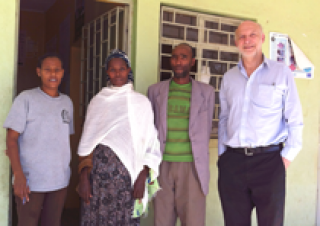
Malnutrition has a devastating impact on children's life chances; it is implicated in 50% of all deaths of under-fives worldwide and also affects children's intellectual ability, capacity to learn and ability to make friends.
The introduction of emergency food supplements has led to huge increases in the rates of child survival in East Africa. Despite these improvements, 51% of children in Ethiopia are stunted (low height for age). Increasingly, research suggests that food interventions work better when they are combined with approaches that focus on strengthening the bond between mother and child.
Our trial investigates the effectiveness of a simple play therapy (emotional stimulation) compared to a control intervention on the recovery of 400 severely malnourished children in Ethiopia. We are testing the hypothesis that encouraging emotional stimulation through the child and mother playing together leads to faster weight gain.

Emotional stimulation involves locally trained youths showing mothers simple techniques for playing with their children. This is being compared to a nutritional education intervention, which focuses on providing advice on the infants' and mothers' dietary needs, hygiene and a range of other concerns. Both interventions also involve the delivery of emergency food.
We are investigating the extent and rate of weight gain in the children and have been collecting height and weight measurements up to one year after the start of treatment. We are also assessing the children's cognitive and emotional development and the psychological well-being of their mothers.
 Close
Close

